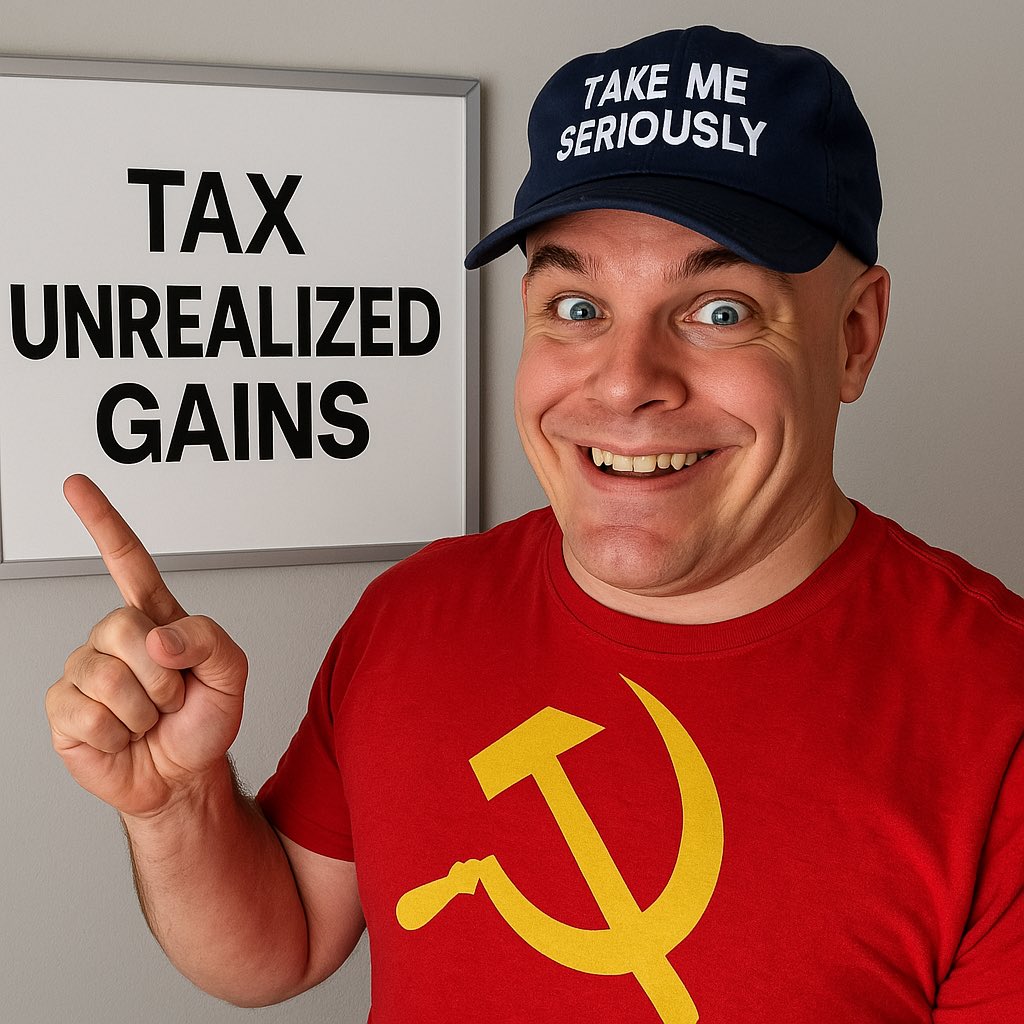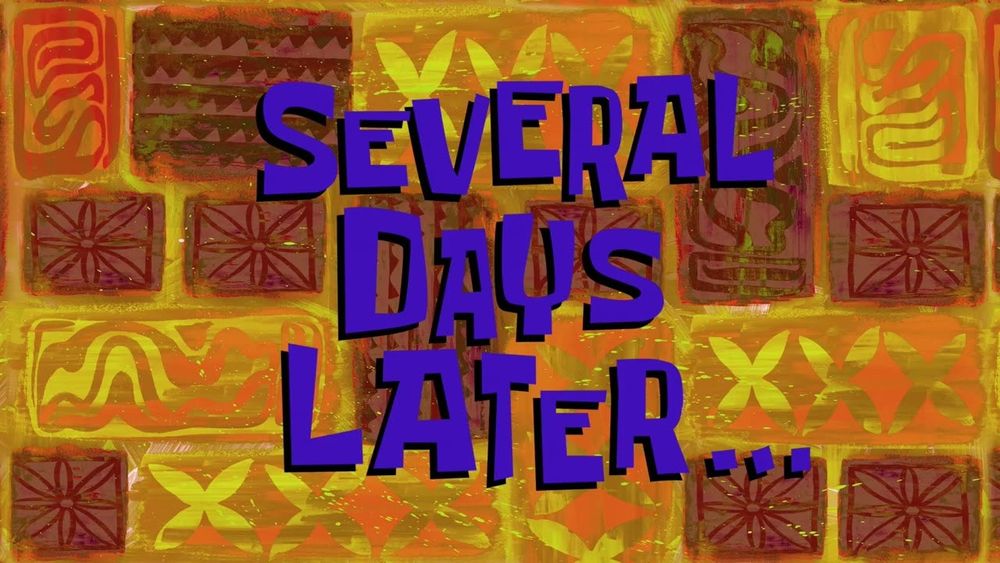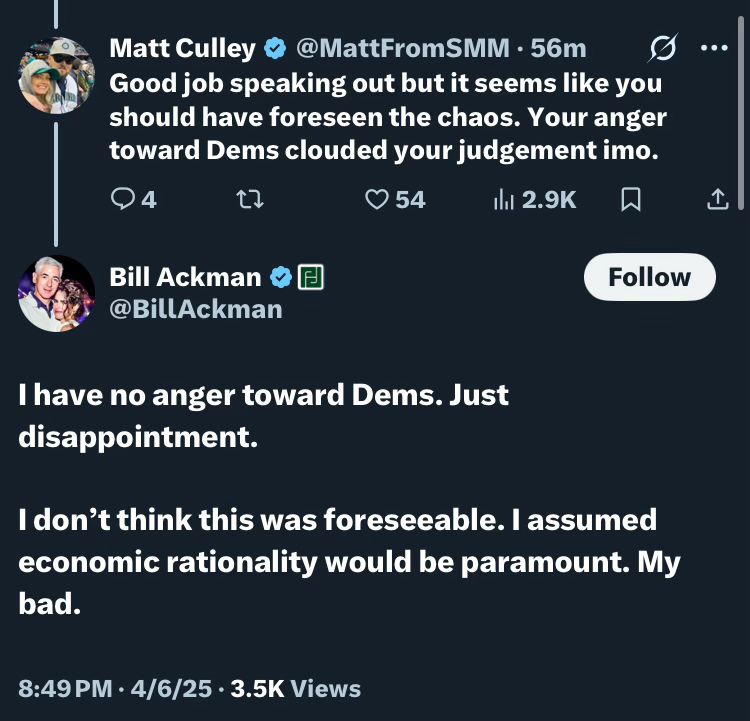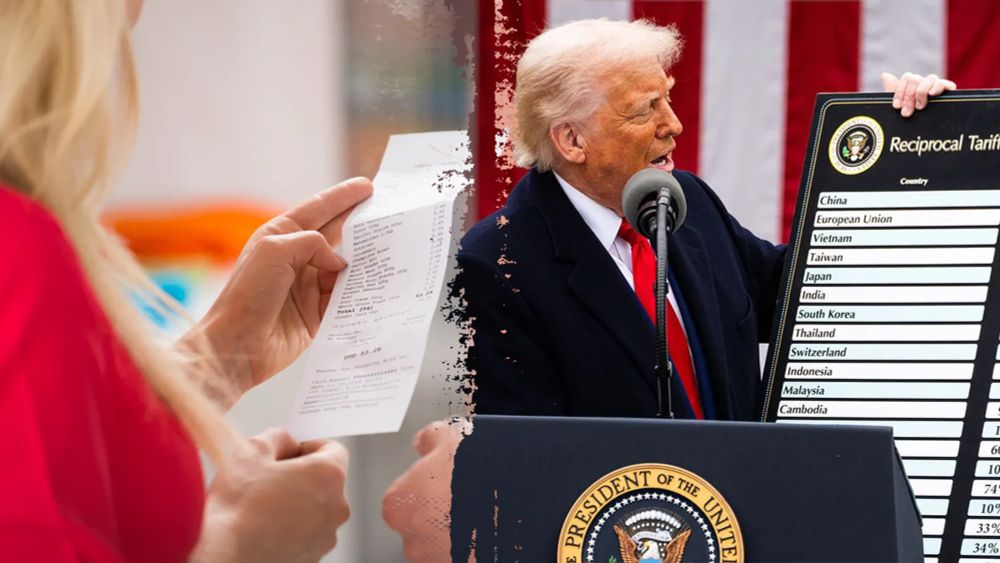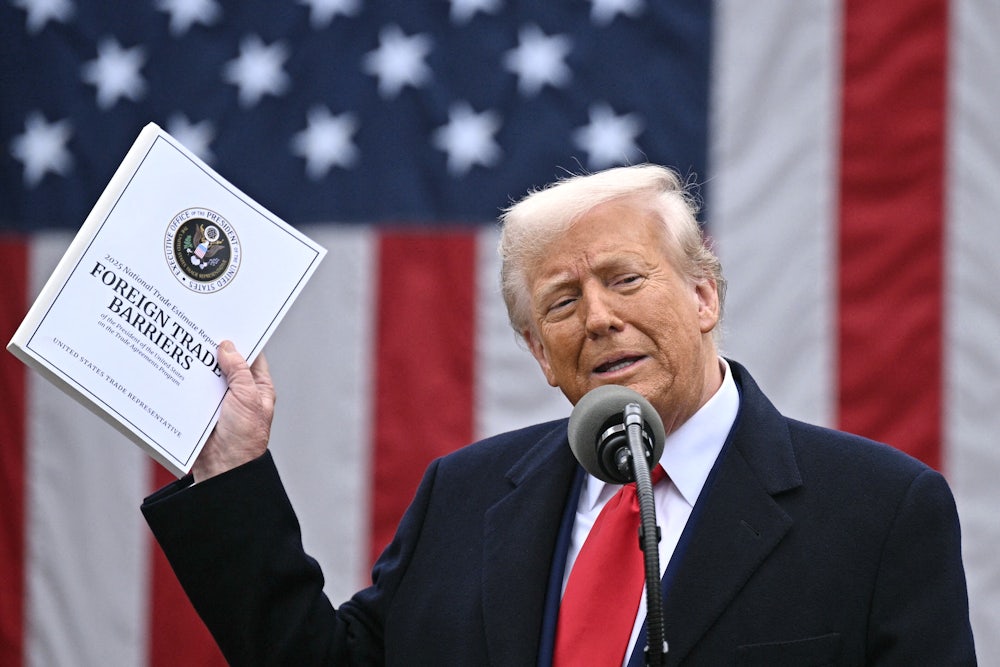They’re claiming, though most economists say they’re exaggerating, $600 to $700 billion in new tariffs.
And I suppose Trump could say,
Well, the new tariff money that I’m going to generate is going to offset any bailouts. But of course, that money actually comes from us anyway, Greg. That’s just tariffs as a taxation. You’re really just moving money around to pay people, and they’re going to pay more in retail prices for a variety of things because of the tariffs we’re imposing. Then you’re going to have to use that money to bail out the higher cost or the lost sales from the retaliatory tariffs place on us. So we’re just moving money around, and it’s really extraordinarily stupid and inefficient.
Sargent: Well, exactly. Tariffs are a tax on consumption in the United States, and the people who pay that are working-class and middle-class consumers. When Trump says,
We’re going to have $600, $700 billion in revenues, and also,
Watch me extend my tax cuts for the very rich, he’s explicitly saying that he’s taking money from the poor and giving to the rich. He’s explicitly saying that he’s shifting the tax burden from the wealthy to the poor and middle class. And yes, I agree. Democrats have a huge opening. I think they should say it that way. They should go out into rural America and say,
Trump is screwing you to give himself and all his rich pals a big tax cut.
Schaller: And it’s not just rural Americans but also working-class Americans who live in cities and suburbs who have jobs around the median household income of $55,000–$65,000 a year. Any sales tax is regressive because a rich man and a poor man pay the same essentially flat tax. Remember Herman Cain, the old 9–9–9? Any sales tax is inherently regressive.
Sargent: You guys wrote a good book about how rural America is hurting itself serially decade after decade by not holding Republican leaders accountable for what their policies have done to the residents of those places. Now, Trump might have the most support in rural America of any politician in many decades, right? Yet at the same time, he’s hurt them enormously—from Covid denial and failure causing tens or even hundreds of thousands of needless deaths in Trump country to these tariffs. How do you account for this disconnect? What are you and I missing here?
Schaller: Well, Paul and I wrestled with this at the end of the book. It’s convenient to just lean on Tom Frank’s argument from
What’s the Matter with Kansas?—a very important book that was read about 20 years ago and inspired a previous book I wrote,
Whistling Past Dixie—because there’s this notion that people are voting against their economic interests. And there’s certainly some truth to that, but I don’t think necessarily rural voters or conservative voters are always voting against their economic interest. Or if they are, they feel that that’s offset by the fact that they’re voting for their social and cultural interests. For example, they believe abortion is murder, so they don’t care if it costs them out of their pocket to save the lives of unborn babies.
When we say they’re voting against their interests, I think we have to be very clear. I don’t think when they vote for somebody like Trump, or George W. Bush for that matter or Mitt Romney, they’re voting against many of their social and cultural interests. They may simply apply greater salience or weight to that than they do their ability to cover their health care costs or their ability to limit their co-pays and out-of-pocket expenses or their tax rates or their local industries.
On the economic side of the equation, I do think they are voting, in many cases, against their economic interest. And this is a serious problem. And I think Democrats and liberals are on the horns of a dilemma between saying,
Ha ha ha, FAFO, you fukked around and now you found out, and,
You vote for what you got and you got what you voted for, and, as Mencken said,
You’re going to get your democracy good and hard here, which is not a very empathetic or liberal attitude in the broadest sense. But of course, these people are voting against the economic interests of the rest of America and denigrating suburbanites and urbanites and criticizing them. They would certainly take their victory laps of owning the libs. I don’t think we should have retaliatory vindictive, vengeful attitudes, but I do think Democrats should point out these inconsistencies in and after to try to claw back.
Sadly, however, because of racial resentments and because of their cultural attachments, it might move the dial a little bit with white rural voters but it’s really probably not going to move it that much. I hate to be grim and dismal about it, but there’s no real evidence to suggest that they’re going to be moved out. They’re like dogs on a bone with a lot of these cultural and social issues and their belief that cities get all the money and everybody’s looking down on them and that they pay taxes and it all goes to minorities for Obama phones. You just can’t convince them otherwise on this stuff, so they continue to vote for the people who sell them those red-meat cultural politics.
Sargent: Well, that brings me to the final question, which is the age-old one. Does an epic screwing over of farm country, of rural America, of Trump country by Donald Trump through these tariffs open the door to Democrats starting to get back some of these voters? You sounded pretty skeptical there, but you don’t really have to move the needle much. And all indications now are that Democrats are going already deep into red country really trying to talk to these voters about what’s happening with Donald Trump and DOGE and Elon Musk. They’re holding town halls in some of these places. I think there’s the capacity to move the needle a little bit. What are the prospects for that?
Schaller: Well, maybe they move the needle a little bit because Trump has reached maximum Republican support in rural areas, whether it’s rural whites or rural nonwhites. But to peg your question to a part of the previous question that I didn’t answer on Covid, the reason I’m a little bit grim about it is because after the vaccine was available in 2021, during the first wave after vaccines, the Delta wave that summer, it was very clear who got sick and hospitalized and died. And it was in the counties that were the Trumpiest counties, because those counties had the lowest vaccination rates, because they believed all of these scurrilous conspiracies about how the vaccines don’t work or the vaccines actually give you Covid. They didn’t want to wear masks.
So even though rural America has a built-in social distancing advantage....People literally live far away from each other; they don’t get on trains and buses and commute; they don’t live in stacked apartment buildings like I do here in Washington, D.C. They should have had the lowest rates. They
did have lower rates before the vaccine, but they should have had even lower rates after the vaccine as long as they took the vaccine. But no. What happened? The rural counties had 2.4 times the death rates of the national average. And compared to city counties, it was 3–1 or 4–1 depending on which counties of reference point. They died at three to four times the rate—literally tens of thousands of rural Americans, excessive rural Americans died—because of Trump, because of their belief that Covid was a hoax, because of all the misinformation about Dr. Fauci and the “Fauci ouchie,” and because of listening to figures like Marjorie Taylor Greene. And Trump took the vaccine. He told them. MAGA conspiracy fuel theories about the virus and about the safety of it literally led to excessive deaths in rural America.
If you look at the charts of Trump support and rurality, the more rural the area, the more they support Trump. And then if you look at those same charts and they track rurality with vaccine, it’s just the opposite. So the Trumpier the county, the less likely people took the vaccine and therefore the highest hospitalizations and death rates. Rural Americans are making decisions and have voted for Trump to bring this back to tariffs. They’re making decisions that don’t just affect their communities; they affect other communities and other industries that are parallel or adjacent. So now, it’s an economic murder-suicide when you make these decisions that don’t just hurt your bottom line, your finances, your ability to pay for Johnny’s braces or Joni’s summer camp but are affecting industries and communities and devastating your neighbors—including your neighbors who didn’t vote for Trump, especially your nonwhite rural neighbors.
Sargent: So Tom, how should Democrats talk to rural Americans about this? How do they go into red America, into some of these swingy House districts, some of these red states, some of these red House districts, which I think are going to be in play in 2026, and say what you’re saying in a way that makes it possible to win over two, three, four points among those demographics? How do they talk about the tariffs? How do they talk about Trump? What do they say?
Schaller: I think they try to talk in the same language that Trump talked about during the election, right? And maybe like Trump, they exaggerate a little bit about the prices of things. Trump has lied consistently. He said the unemployment rate under Obama was 42 percent in one tweet, and he says Biden created the worst economy in American history, even though
The Economist magazine, no liberal rag, said our economy was “the envy of the world” by the end of the Biden administration. It wasn’t perfect, but we did manage inflation better than any other Western European democracy. We created 700,00o industrial jobs. So go in there and frankly scare them with stories about the economic consequences.
The problem, Greg, is where they get their information. I spent time in rural Pennsylvania the weekend before the election and in places like Cumberland and Lancaster. We didn’t see Republicans out in the streets, because they don’t really do field campaigns anymore. It’s all digital and electronic and through people’s phones, not through people’s front doors. It’s really hard to get face-to-face with people anymore. So Democrats got to get on these local radio shows. They have to create their own local radio shows. They have to get on these podcasts because they’re living in an informational vacuum or a silo, so they’re not hearing these messages anyway.
As we’ve seen on Bluesky today, Fox News and OANN are not even putting the market reports up there. They’re not even showing the Dow, the S&P, and the NASDAQ on their tickers because they know that their listeners and viewers cannot handle any negative news. They need to be constantly reinforced with nonstop pro-red, pro-Republican, pro-Trump, pro-MAGA news because they can’t handle the truth, as Jack Nicholson would say. We need to break through that and force them to listen to alternative messages, but that is a really, really difficult nut to crack.
Sargent: It sure is, and it just seems to get more difficult with every passing year and every passing cycle. Tom Schaller, it’s so good to talk to you, man. Thanks for coming on.
Schaller: Great to be here. Cheers, Greg.
Sargent: You’ve been listening to
The Daily Blast with me, your host, Greg Sargent.
The Daily Blast is a
New Republic podcast and is produced by Riley Fessler and the DSR Network.
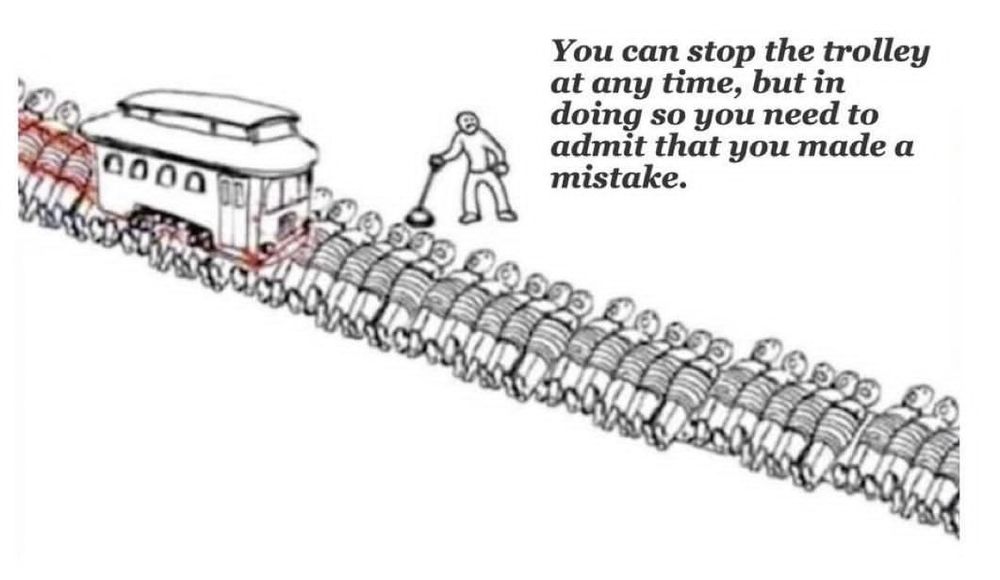

 badhombrenps.bsky.social
badhombrenps.bsky.social
 pithypacky.bsky.social
pithypacky.bsky.social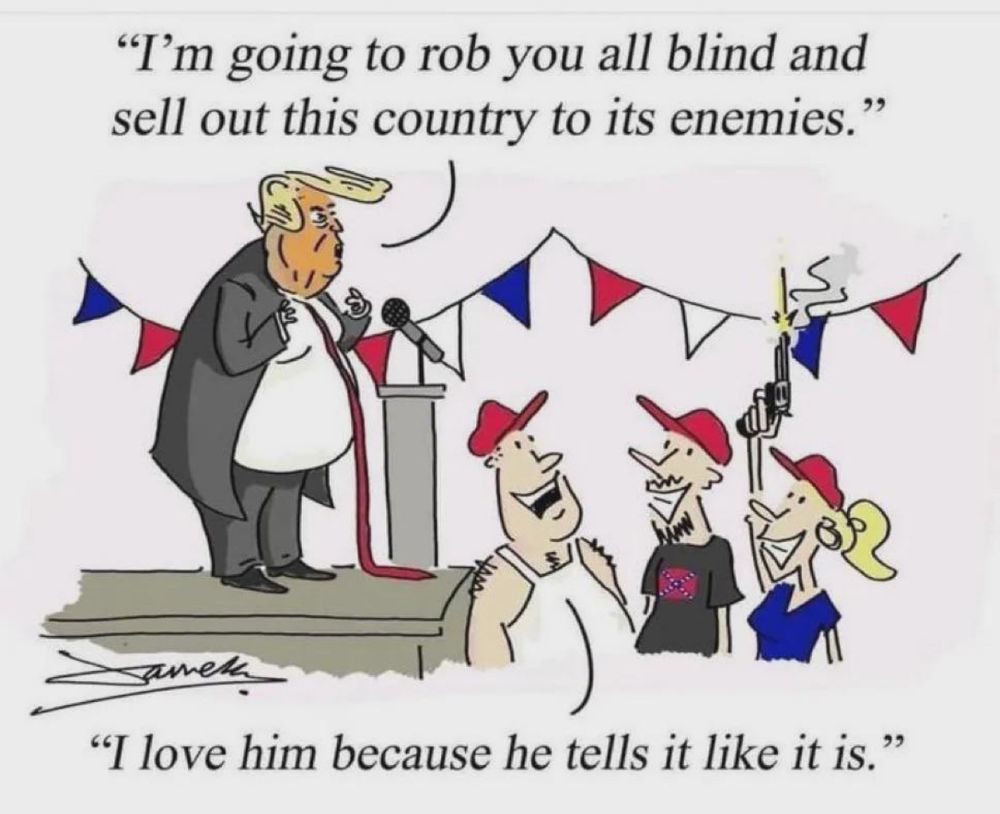
 tiggertre42.bsky.social
tiggertre42.bsky.social badhombrenps.bsky.social
badhombrenps.bsky.social












